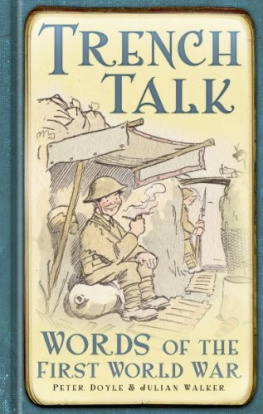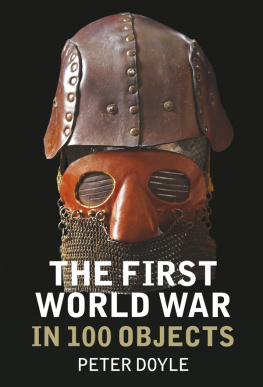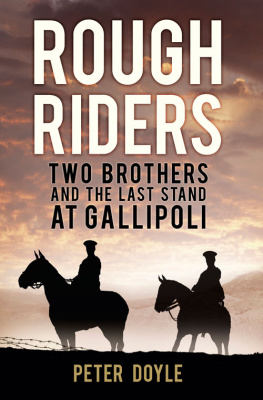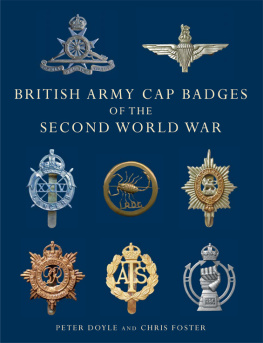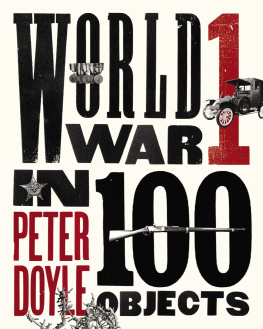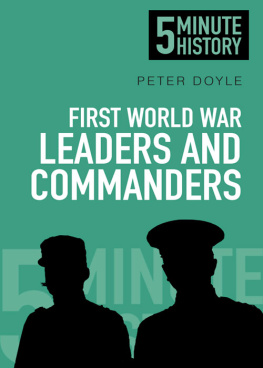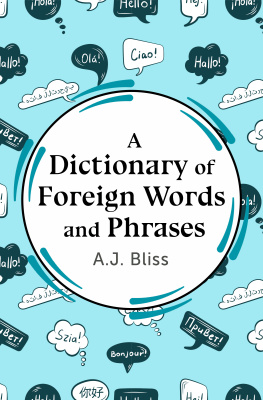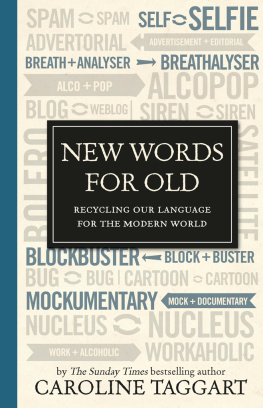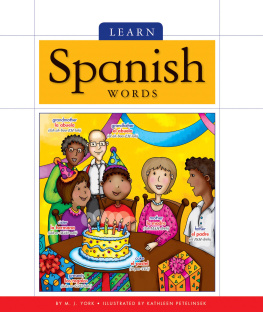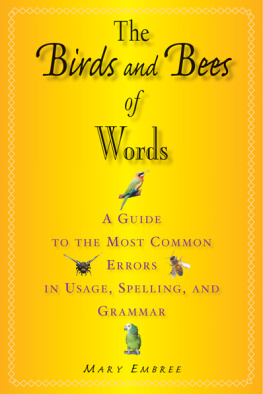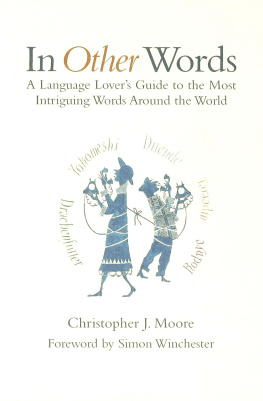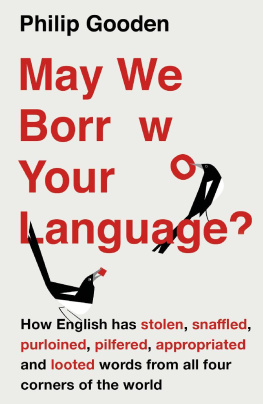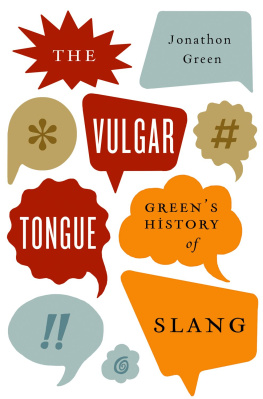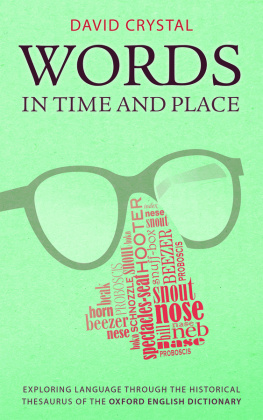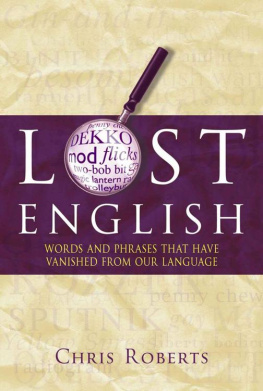For
Arthur Doyle (d.1962)
Frederick Walker (d. 1961)
William Black (d. 1915) and
Leonard Lightfoot (d. 1917)
C ONTENTS
T he First World War or the Great War as it was known to the people who experienced it largely directed the course of the twentieth century. Fought on three continents, the war saw 14 million killed and 34 million wounded, countless millions displaced and the ends and beginnings of several states. Its impact shaped the world we live in today, and the language of the trenches, the common speech of the participants, continues to live in the modern consciousness.
One of the enduring myths of the First World War is that the experience of the trenches was not talked about. Yet dozens of words entered or became familiar in the English language as a direct result of the soldiers experiences. This book examines the first- and second-hand experience of the First World War and how it changed standard English, adding words that were in both slang and standard military use, and modifying the usage and connotations of existing words and phrases. Several words became associated specifically with the propaganda or official language of the war, some were adopted as a result of operations in parts of the world far from Flanders, and some had only a short life as part of English. In contextualising and tracing the history of what these words meant to the men in the trenches the book presents the effect the war had on the English language.
Peter Doyle
Julian Walker
W e are grateful to the Imperial War Museum and to the copyright holders for access to the original diaries, papers and letters of: J. Bremner, B. Britland, W. Egington, W.G. Green, C.P. Harris, R.J. Hartley, J.T. Lawton, C.P. Harris, P.S.V. Rouse, R.I. Smith, R. Stockman, J. Underwood and K.S. Wyatt. We thank Brightsolid and the British Library for permission to quote from the British Newspaper Archive. We thank Andy Robertshaw and Paul Reed for their advice, and particularly to Paul for kindly supplying the Somme Knuts and Bing Boys photographs; all other images are our own, apart from that of Jack Johnson, which is from the Library of Congress. We are grateful to Jo de Vries for her enthusiastic support.
T he First World War marked a change in the relationship between the British public and the military, as for the first time a large sector of the public became the military, specifically the army. During this period the language of the army was a melting pot of slang, officialese, jargon, invention, adoption and swearing, from all parts of the British Isles and the British Empire, from other languages (including those of enemy countries), from all classes and occupations, with some of its technical terms dating back to the Medieval period. All this was condensed, mixed, confused and mispronounced and brought back to a country whose sense of the correct order of things was collapsing.
Written communication during this period was of paramount importance in 1913 a small town could expect up to twelve postal deliveries per day, and in 1917 19,000 mailbags crossed the Channel daily. The war was discussed, reported and commented on in letters, newspapers, postcards, pastiches of field service postcards, poems, songs, sketches, trench papers, novels, official documents and diaries. But since spoken English is not the same as written English, how can we get to the actual words spoken? With the passing of time the English spoken during the war, at the front and away from it, has become progressively less accessible.
Written words are always mediated by their context; the setting down of words proposes a reader, even if the reader is the person writing. The diaries used by soldiers during the war are circumscribed by the tiny amount of space allowed (and by the official dictum that diaries were forbidden, in case they should fall into enemy hands), or when exercise books were used for journals, the blank page was likely to create the desire to write well, to make a meaningful comment or aspire to a literary standard. The nature of education in Edwardian England proposed a certain style of letter-writing; even letters from prisoner-of-war camps maintain a formula of information about the weather, reassurances of the health of the writer, and inducements of optimism, like the sentiments buried within the carefully constructed official phases of the field service postcard, doing away with all necessity of original thought. Junior officers, fresh out of public schools, and Other Ranks (ORs) soldiers had been brought up to carefully limit the expression of their feelings, or to adopt formulaic postures of phlegmatic reticence. I must get. Cheero, writes a subaltern at the end of a letter quoted in The Scotsman in July 1916, while John Buchan quotes one of the Grenfell brothers as saying, I am bound to say I felt rather done after a raid; terms for being killed included getting it, hopping it; getting em was understood as being afraid. Clearly death, fear and having to attack could be made less real by avoiding giving them names. Fear at the Front had to be suppressed (often by creating witty variations of the phrase getting the wind up), just as much as failure had to be hidden behind the euphemisms and false reporting which the press and the official bulletins served to the home audience. Diaries were written with the knowledge that they might be looked at later by loved ones, letters were sent by soldiers knowing that they would be examined by censors, and were written to reassure those at home, memoirs were composed for specific kinds of readers to shock or to avoid shocking, with the desire either to not awaken old traumas or to do just that. Soldiers memories recorded by interviews might be even more circumspect, the recording process inducing its own sense of performance, and the fear that the speaker might have to justify words he could not retract; and these would be in any case edited by the filtering and altering process of recall. Novels of the war, while holding no punches in describing the destruction of the body, avoid swearing, while shame or embarrassment mean that the bodys involuntary reaction to fear is not discussed. The lack of a form of words other than the clinical or the literary to express the most extreme experiences of the front and the nature of the destruction of the body meant that for the most part a silence fell over the subject.
Against this there is the wit and invention of the concert party song and the trench newspaper, the clever banter of the catchphrase exchange, the survivors forced indifference, the occasional slips into half-remembered phrases from literature or the Bible, the savagely altered music hall song, the outpouring of verse, the double-speak of the official bulletin and the unfounded optimism of press-reporting, or the all-too-rarely recorded robustness of obscenity. Share this amongst you, shouts the soldier with comic-book callousness, tossing a bomb into a dug-out, while another soldier on a burial party slips into lyricism as he notes some seeming by their looks to have died very easy, others very hard. It is as if the destructivity of the war had to be balanced by creativity in language.
But a study of the words of the war, though benefiting from a wealth of sources, can barely touch the core of the experience the verbal witness of the destruction of the body as it happens. It is perhaps the inexpressibility of that core that makes the language of the period 19141918 so fascinating. It is as if the breakdown of language to adequately describe the physicality of the killing of so many thousands of young men is compensated for by a wealth of language for everything surrounding it. Both despite and because of the inexpressible pain and destruction, the Great War became a major phenomenon of verbal culture.
Next page
